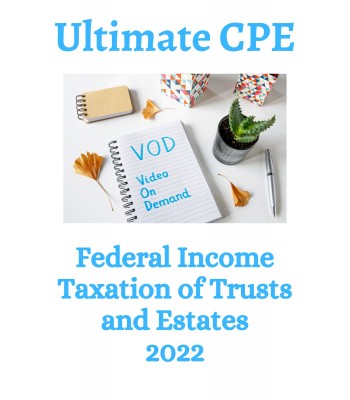UltimateCPE, Inc. is registered with the National Association of State Boards of Accountancy (NASBA) as a sponsor of continuing professional education on the National Registry of CPE Sponsors. State boards of accountancy have final authority on the acceptance of individual courses for CPE credit. Complaints regarding registered sponsors may be submitted to the National Registry of CPE Sponsors through its website: NASBAregistry.org.
Author: Steven G. Siegel
| CPE Credit: | 2 hours for CPAs 2 hours Federal Tax Related for EAs and OTRPs 2 hours Federal Tax Law for CTEC |
As more clients are using trusts for estate planning, asset protection and wealth management purposes, and in reaction to planning issues prompted by the pandemic, it is essential that practitioners develop practical knowledge regarding income taxation of trusts and estates. This webinar provides a concise and useful review of key issues and considerations that arise in connection with the income taxation of trusts and estates.
Publication Date: May 2022
Designed For
This course is essential for CPAs, CFPs, enrolled agents, estate planners, tax attorneys, and other professionals who advise clients on tax, retirement and estate planning, and other wealth management matters.
Topics Covered
- Basic Concepts and Issues
- How estates and trusts are taxed
- Tax Return Filing Requirements
- Trusts
- Estimated Tax Payments
- Tax Return Filing Requirements
- Tax Rates
- Election to Treat a Qualified Revocable Trust as Part of the Decedent's Estate
- Fundamental Concepts: Trust Accounting Income, Distributable New Income, Taxable Income
- Income Reportable by Fiduciaries
- Planning Notes
- Deductions Available to Fiduciaries
- Specific Items of Deduction
- Income Distribution Deduction
- Distributions; Special Issues and Situations
- Trusts and Estates and the Alternative Minimum Tax
Learning Objectives
- Recognize how estate and trust income is taxed
- Identify how estate and trust income is defined, calculated, and reported
- Describe key compliance and planning issues as well as concerns related to fiduciary income taxation
- Identify when the decedent's taxable year ends
- Recognize which type of trust has an annual exemption of $300
- Describe trust accounting income
- Recognize the annual net capital loss deduction limitation against ordinary income
- Recognize how many months an automatic extension could be filed for Form 1041 (by using Form 7004) for an estate
- Identify the annual exemption for complex trusts
- Recognize what would apply if a fiduciary fee may be deducted
Level
Basic
Instructional Method
Self-Study
NASBA Field of Study
Taxes (2 hours)
Program Prerequisites
None
Advance Preparation
None
Additional Course Details
- Filed of Study: Taxation
- Publisher: Wolters Kluwer
- Course Level: Basic
- Pre-Requisites: None
Write a review
Your Name:Your Review: Note: HTML is not translated!
Rating: Bad Good
Enter the code in the box below:


